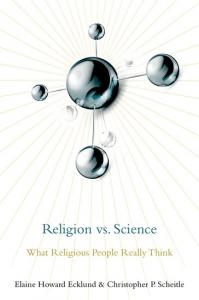 Religious people, including evangelical Christians, are generally supportive of science. On the other hand, they often distrust scientists. There are some valid reasons for distrust – when some of the loudest voices condemn or belittle religion portraying science as true enlightenment. Elaine Ecklund and Christopher Scheitle conclude their book Religion vs. Science: What Religious People Really Think with some thoughts on productive ways forward.
Religious people, including evangelical Christians, are generally supportive of science. On the other hand, they often distrust scientists. There are some valid reasons for distrust – when some of the loudest voices condemn or belittle religion portraying science as true enlightenment. Elaine Ecklund and Christopher Scheitle conclude their book Religion vs. Science: What Religious People Really Think with some thoughts on productive ways forward.
First, they note that “most, if not all, of the apparent tensions or conflicts between religion and science for religious people can be tied to concerns about what a particular scientific issue means the perceived role of God in the world or the perceived sacredness of humanity.” (p. 140) This is an important observation because it allows us to focus on the most significant issues. As a scientist and a Christian I find that there is no intrinsic conflict between science and God’s action in the world or the sacredness of humanity – in fact, scientific study and pursuits can provide means to alleviate suffering and promote human flourishing. Certain views – e.g. young earth creationism – are in conflict with science. The question for religious people (especially evangelical Christians) is whether young earth creationism is the only faithful interpretation of Scripture. I don’t believe it is the only or even the best interpretation of Scripture. Other views – e.g. eugenics – are in conflict with religion, but these are not ‘scientific,’ they merely exploit science to achieve an end.
For scientists who hope to sway the opinion of religious Americans a focus on the key issues will help to pave the way. Heavy-handed approaches will make few converts. In addition, Ecklund and Scheitle “would encourage all scientists to refrain from making theological claims – and to highlight, when relevant, that their work does not make theological assertions.” They go on “Science has limitations, and religious individuals want to see that scientists believe this, and will not try to utilize science to make arguments about things outside the scope of science or take science beyond its intended purpose (what the philosopher Gregory Peterson calls “disciplinary imperialism”).” (pp. 142-143)
Second, religious people and scientists need to talk face-to-face. Segregation serves to feed the myth and prevent progress. The conversation is most effective when religious scientists act as a bridge between faith communities and the scientific community. They are (or can be) capable of talking both languages and will generally take both claims (science and faith) seriously. Unfortunately, many feel pressure to stay under the radar on both sides of the issue – unwilling to rock the boat by discussing science at church or religion at work.
This is where Christian pastors or other church leaders have an important role to play (along with leaders in other religious communities – but here I will focus on Christians). Ecklund and Scheitle note “our survey data show that congregants ask their religious leaders questions about the implications of science and they trust their responses. Thus, it is up to these faith leaders to create and atmosphere in which their congregants can feel comfortable discussing difficult issues related to faith and science.” (p. 144)
It is destructive to take a hardline position quashing discussion – no matter what the leader’s view on evolution or climate change or … While a few may feel comforted by such an approach, many more will find the environment stifling. Where can a young science student, or an established scientist for that matter, go to critically think about the compatibility of science and faith? The topic is ruled off-limits at church often leaving the last or only word to those who deride any faith position. Not only is such an approach destructive to the faith of some within the church, it puts a roadblock in the path of those who are not believers, but might otherwise be open to considering the question.
Both books, Elaine Ecklund’s Science vs. Religion: What Scientists Really Think and Ecklund and Scheitle’s Religion vs. Science: What Religious People Really Think are worth reading and pondering as we try to move beyond the myths and into the future.
If you wish to contact me directly you may do so at rjs4mail [at] att.net.
If interested you can subscribe to a full text feed of my posts at Musings on Science and Theology.











